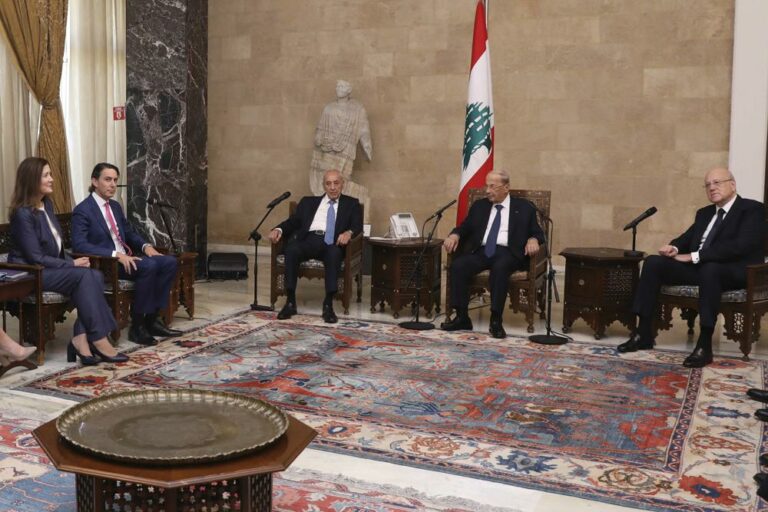Lebanon and Israel are getting closer to reaching a deal in a more than a decade-old maritime border dispute between the two neighbors, a U.S. envoy and Lebanese officials said Monday.
Lebanon and Israel have been officially at war since Israel’s creation in 1948 and both countries claim some 860 square kilometers (330 square miles) of the Mediterranean Sea.
Amos Hochstein, a senior adviser for energy security at the U.S. State Department who has been mediating between the two neighbors, expressed optimism after his meetings Monday in Beirut with Lebanon’s president, caretaker prime minister and parliament speaker.
The joint meeting between Hochstein and the top leaders may indicate that a breakthrough could be near and that Lebanon’s political leadership backs such a deal.
“The atmosphere is positive and the gap of disagreements in this field is narrowing,” Deputy Parliament Speaker Elias Bou Saab told reporters after the meeting.
Hochstein arrived in Beirut on Sunday to inform Lebanon of Israel’s response to Beirut’s June proposal over the disputed sea border area.
Following his last visit to Lebanon in June, Hochstein told the U.S.-funded Alhurra television that the Lebanese government took “a very strong step forward” by presenting a more united approach, and anticipated that there could be progress to reach a settlement.
“I remain optimistic that we can make continuous progress as we have over the last several weeks,” Hochstein said in brief comments after the 90-minute meeting at the presidential palace.
He added that he looks “forward to coming back to the region” and “being able to make the final arrangements.”
Parliament Speaker Nabih Berri described the talks as “positive.”
Lebanon’s caretaker Foreign Minister Abdallah Bouhabib told the local Al-Jadeed TV that major progress has been made. “We are trying to set things up so that we can search for gas and they (Israelis) too,” he said.
Lebanon is in bad need of an agreement as it hopes to exploit offshore gas reserves to try and alleviate what has become the worst economic crisis in its modern history.
On Sunday, Lebanese terror Hezbollah group aired drone footage of Israeli ships in a disputed gas field in the Mediterranean Sea, highlighting the tension at the center of U.S.-mediated Israel-Lebanon maritime border talks.
Lebanon claims the Karish gas field is disputed territory under ongoing maritime border negotiations, whereas Israel says it lies within its internationally recognized economic waters.
The Israeli military earlier this month shot down three Hezbollah unarmed drones flying over Karish gas field in the Mediterranean Sea. Mikati at the time criticized Hezbollah, saying the move could pose risks to the country.
Hezbollah leader Hassan Nasrallah in an interview last week said that the militant group can locate and strike Karish and any other Israeli gas field.
Later Monday, Hochstein told the local LBC TV station, when asked about Hezbollah’s recent activities, that the best and only way “to achieve a resolution to this long-lasting dispute is through the negotiating table and through diplomacy.”
He warned that anything else “has the risk of causing some miscalculated harm to those negotiations and end them.”
Israel and Hezbollah are bitter enemies that fought a monthlong war in the summer of 2006. Israel considers the Iran-backed group its most serious immediate threat, estimating it has some 150,000 rockets and missiles aimed at Israel.
(AP)












2 Responses
All coastal waters of the Eastern Mediterranean up Sidon belong to us. This is the historic territory of שבט אשר.
up to Sidon*